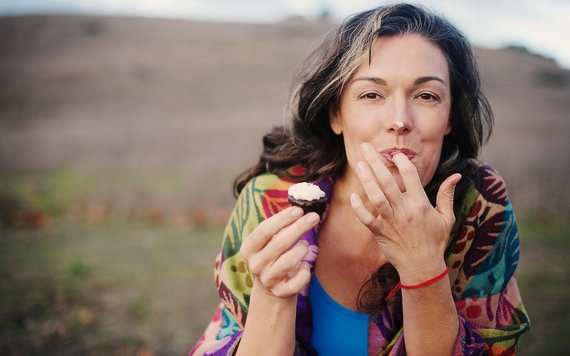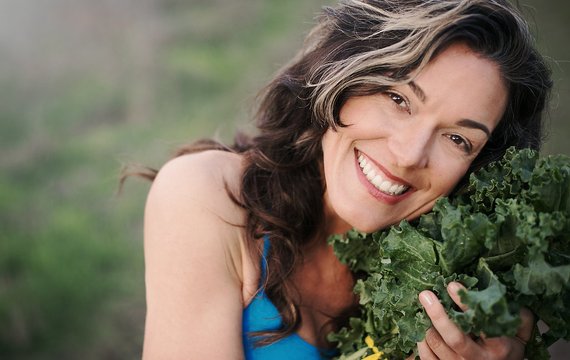It's frustrating. The diet your coworker shared with you over celery sticks -- maybe it worked at first. You followed it perfectly -- except for the champagne and cake at your sister's wedding, and that late night when you ate candy bars from the vending machine for dinner. The scale more or less obediently clicked down in response to your willpower-fueled meals and workouts. But then one or two, or five years later, you find yourself among the nearly 95 percent of Americans who discover that not only did they gain back the weight they worked so hard to take off, but they had to start shopping for pants a size bigger than before they'd started.
At least you know you're not alone. That 95 percent represents a lot of us, including me. But diet-cycling is a kind of misery that avoids company: we don't like to share our diet failures. It's never the diet's fault, right? It must be the diabolical goodness of dulce de leche ice cream or the dust we let gather on the stationary bike or our own lack of willpower.
Writer Anne Lamott says that when she told her therapist about her latest diet plan, her therapist responded, "Oh, that's great, honey. How much weight are you hoping to gain?"
So here's the question: If you knew before you started dieting that there's a 95 percent chance of going up a dress size after five years instead of down, would you still do it? Most Americans would. Most Americans do.
If you're still hoping to win the magical jackpot diet in the sky, feel free to stop reading here and resume your search for the next fad weight loss plan. May I suggest the Cold Diet, where you freeze your ass off in a cryogenic container to burn extra calories? Or the Food Babe, where you become so paranoid about chemical contaminants you can hardly eat anything?
If you've already tried those diets or their not-so-distant cousins, if you've already yo-yo dieted through enough poundage to make a whole new you, then maybe, if you're lucky, you've reached that critical moment my friend, dietician, and nutrition therapist Karen Scheuner calls "Diet Bottom." And I'm here to say, "Congratulations."
Diet bottom happens when we've tried it all, when we've suffered nights of self-induced hunger pangs and injured our knees from too much Stairmaster, and we finally say, "What the hell am I doing to myself? I hate every single freaking minute of dieting and it never lands me anywhere except on my ass."
To hit diet bottom, you gotta have the moment when you yell, "As God is my witness, I'll never eat another 200-calorie microwave meal again!"
Savor this moment. It's the turning point, the event horizon, the instant you reach for the red pill instead of the blue one. You don't have to diet again. Ever. You can call a truce with your body and with food and never look back.
My moment happened when at 33, I was the mother of a pre-schooler and the survivor of yearly diet crashes -- the Grapefruit Diet, the juice cleanse, and multiple variations of low-fat, low-sugar, low-taste diets. One particular day I caught yet another glimpse of myself in the mirror, triggering the usual explosion of self-criticism and low-fat fantasies -- an event that happened at least 20 times a day -- and I thought, I can't go on like this.
Every mirror made me desperate to diet, and every diet made me hate myself more than the one before.
Within hours of whatever new fad diet I had decided would win me my trophy body, I'd swear off eating things I loved, like corn chips (they are bad and wrong and think of the fat!), and then find myself mindlessly eating a whole bag: pouring the crumbs into my hand and licking the salt off my palm. And then I'd resolve to never eat corn chips again -- until the next binge. Dieting brought out in me the exact deprive and binge behaviors I hated most about myself. I took me a long time to notice that those behaviors were less likely to show up on my plate when I wasn't punishing myself for enjoying crunchy savory snacks.
Looking back I remembered the unhappiest year of my life: when as a teenager I successfully ate no corn chips and nothing else with calories, either. As my clothes loosened around my body, damp tissues proliferated in my pockets, between my books, and under the sofa from tears that flooded my eyes whenever I was left alone. At 15, thinness did not equal happy. As an adult, binging made me and my body miserable. Still, it took me until 33 to decide that a diet was not going to swoop in like some vengeful calorie-counting knight and save me after all.
They say you can't hate yourself happy. So what do we do instead? Can we love ourselves into happiness? What does that even mean?
I didn't know, but I was willing to try. Are you?
Your body, this body you're sitting in right now, wants you to be happy. It wants you to live a long, satisfying life, and has a lot of awesome ideas around how to make that happen. What would happen if we chose to let our bodies lead us to happiness and love?
Loving yourself happy takes years. It took me four years before I felt like I was any good at it. First I had to say no to my inner bully, the voice that told me that I was wrong and bad. I would never be happy listening to that voice. Instead I started listening to the voice that said, "Maybe you're fine. Maybe you're good enough already. Maybe a diet isn't going to fix everything."
Then I took baby steps of trying to listen while eating my way through yet another bag of chips, and found I couldn't hear a thing over the crunching noises in my head. But I definitely heard the stomachache later. Slowly I began to listen a little more closely... and realized my body didn't enjoy eating the whole bag, just a couple handfuls were perfect. I learned that the achy feeling in my hips when I'd been sitting at my laptop too long was my body's way of saying it wanted to get up and stretch and move and play. And the more I listened to my body, the better I felt.
The essence is simple. You brush your teeth every day, probably even twice. Do you do it to punish yourself? "Bad teeth, go sit in the corner." Of course not. Most of us do it because we care about our teeth -- we want them to feel good and continue to fulfill their valuable purpose of chewing and crushing our food without cavities or pain.
It's the same thing when we sit down to eat or go out to exercise: you don't do it to punish yourself or your body.
You do it to take care of yourself, because you know when your body feels good, you feel good. You eat and move your body out of love. You listen to the things your body likes (mine loves kale, cupcakes, yoga, naps, and uphill hikes) and give it lots of those things. You listen to what your body dislikes (mine hates stomachaches from overeating and being injured from being pushed too hard), and because you love it, you skip those things as much as possible -- though if they happen sometimes, you apologize to your body and move on.
So when you've reached your diet bottom, when you've prayed for laser eyes to blast away the entire diet industry, when you're ready to take the radical leap of trusting yourself instead of undermining yourself, here are the first steps:
1. Throw away the scale, the diet books, and the measuring tape.
2. Start to listen to your body. What does it enjoy in food and movement? What does it hate?
3. Give your body what it's asking for, and see how it feels.
4. Rinse and repeat with as much love as you can manage.
Learning to trust myself has allowed me to be happy in my body in a way I never imagined possible. But it required that I stop judging my happiness by looking in the mirror and comparing my body to other women's bodies. It required that I look inside, listen to and trust my body, and find happiness by turning away from appearance and toward my heart.
If you're struggling with an eating disorder, call the National Eating Disorder Association hotline at 1-800-931-2237.
References: Grodstein, F., Levine, R., Spencer, T., Colditz, G. A., & Stampfer, M. J. (1996). Three-year follow-up of participants in a commercial weight loss program: Can you keep it off? Archives of Internal Medicine 156(12), 1302. Neumark-Sztainer D., Haines, J., Wall, M., & Eisenberg, M. ( 2007). Why does dieting predict weight gain in adolescents? Findings from project EAT-II: a 5-year longitudinal study. Journal of the American Dietetic Association, 107(3), 448-55. Garner, DM, Wooley, S. Confronting the failure of behavioral and dietary treatments for obesity. Clinical Psychology Review, 1991; 11:729-780. Mann, T, et al. (2007). Medicare's search for effective obesity treatments: Diets are not the answer. American Psychologist, 62(3), 220-233.
For more statistics on the inefficacy of dieting and the links between dieting and eating disorders, visit the website for the National Eating Disorders Association, and ASDAH, the Association for Size Diversity and Health, fact sheet pdf.
For a wider view on the research and findings about the long and short term effects of weight-loss on the body, see Linda Bacon and Lucy Aphramor's book, Body Respect: What Conventional Health Books Get Wrong, Leave Out, and Just Plain Fail to Understand About Weight (2014, Ben Bella Books), especially chapter 2, Weight Regulation and chapter 3, Weight Loss Realities.
Photo credit: In Her Image Photography

